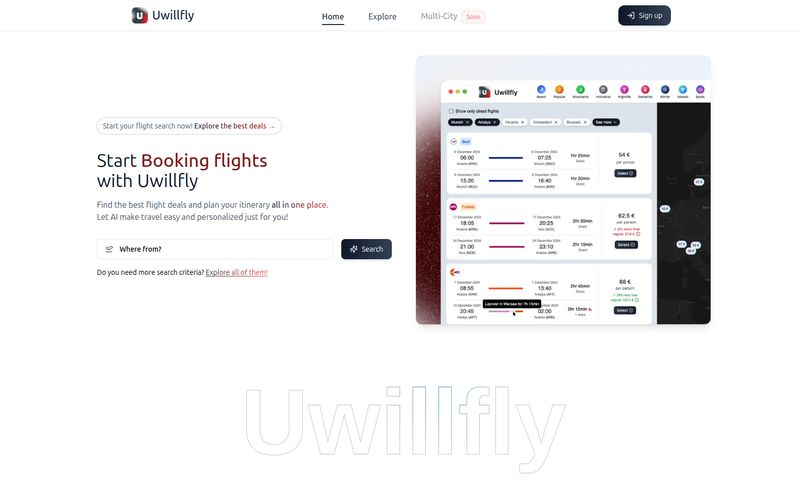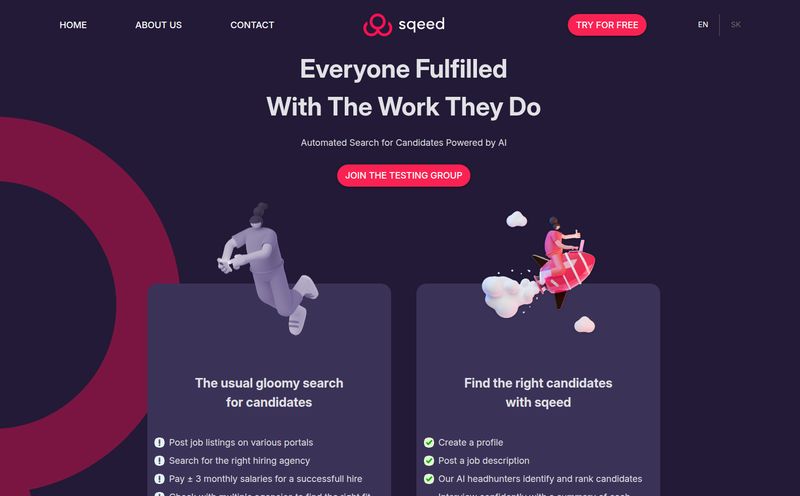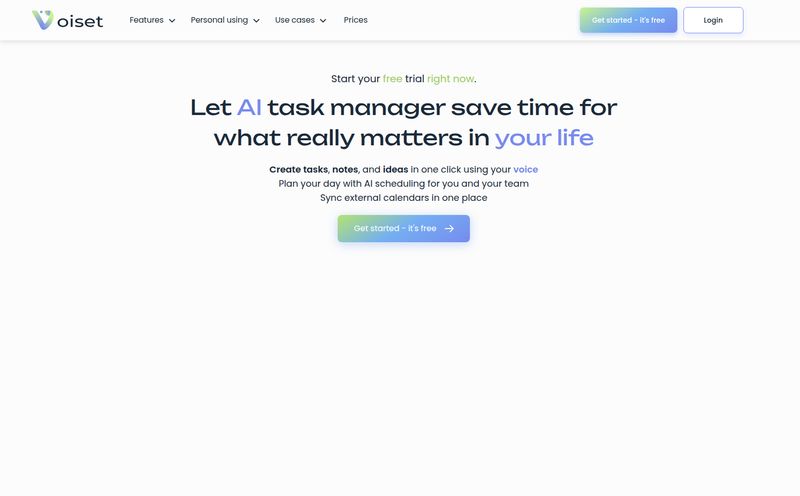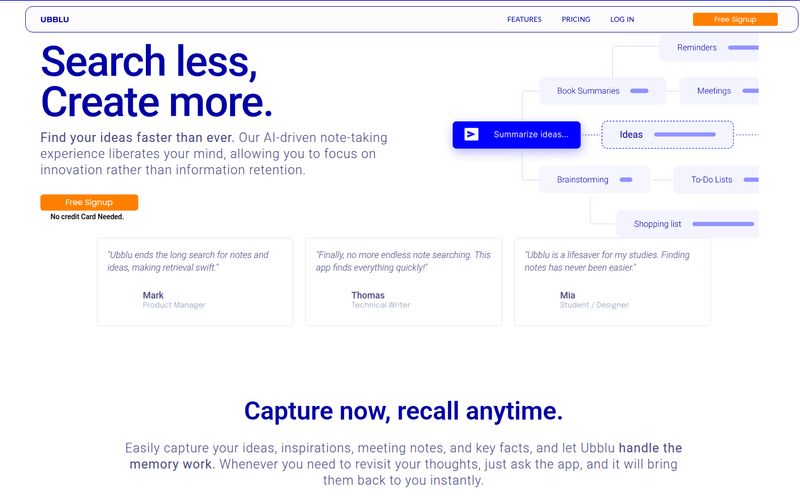I’ve been in the digital marketing and SEO space for what feels like a lifetime. I’ve seen trends come and go, platforms rise and fall, and the tools we use for work and life get progressively… louder. My notes app, for instance, has become a sprawling digital metropolis. It’s got team spaces, AI that wants to write my emails, collaborative documents, and a million templates I’ll never use. It’s powerful, sure, but sometimes I just want a quiet corner. A simple notebook.
So when I stumbled across something called Freenote, my interest was piqued. The description was music to my ears: an open-source, AI-powered journal that stores everything locally. Could this be it? The digital equivalent of a Moleskine notebook that also happens to have a photographic memory? I had to find out.
What Exactly is Freenote Supposed to Be?
Let's break down the promise here, because it hits on a few things that are becoming increasingly important in our hyper-connected world. Freenote positions itself as a journal app built on a few core tenets. First, it's open-source. For those not deep in the tech weeds, that means its underlying code is public. Anyone can look at it, verify it’s not doing anything sneaky, and even contribute to its development. There's a certain comfort in that transparency, a stark contrast to the closed-off, proprietary systems we usually entrust our data to. It’s a community thing, and I've always had a soft spot for that ethos.

Visit Freenote
Second, and this is the big one for me, is its commitment to local-first storage. All your notes, your random thoughts, your secret plans for world domination—they live on your device. Not on some server in who-knows-where, owned by a company whose privacy policy is 50 pages long. This is a massive win for privacy. It’s like choosing to keep your diary in a locked drawer instead of posting its pages on a public bulletin board.
And finally, it has a dash of AI. But it’s not the generative, “let me write a sonnet for you” kind of AI. It’s more of a personal librarian. The AI is there to help you search and summarize your own past entries. This is genuinely useful. Imagine being able to ask your journal, “What were my main thoughts on that marketing project last March?” and getting a clean summary. That’s smart, not just flashy.
My First Impressions: A Minimalist's Dream or Just... Minimal?
When you first open Freenote, you're greeted by… well, nothing. And I mean that in the best way possible. It’s a blank page with today’s date. That’s it. No tutorials, no pop-ups, no “helpful” tips. Just a blinking cursor, patiently waiting.
For someone who fights distraction for a living, this is bliss. It’s a quiet space designed for one thing: thinking. But there's a flip side to this minimalism. During my digging, I also ran into a “404 This page could not be found” error on what I thought was an official link. This speaks to the nature of some open-source projects; they can be a bit elusive, a bit like a well-kept secret. It's not a polished, billion-dollar corporate product, and that’s both its charm and a potential hurdle.
The Core Features That Make Freenote Stand Out
Beyond the philosophy, the actual features are what make or break a tool. Freenote has a few that are worth a closer look.
The Magic of Local-First: Your Data, Your Fortress
I can't stress this enough: owning your data is a big deal. With Freenote, your privacy is structurally guaranteed by its architecture. Your deepest thoughts aren't being scraped to train a corporate language model or targeted for ads. It's a true digital sanctuary. However, this comes with a very important responsibility. The fortress is yours to defend. If your computer crashes and you don't have a backup, your notes are gone. Poof. It’s the trade-off for ultimate control—you become your own IT department. So, if you go this route, a solid backup strategy isn't a suggestion; its a necessity.
AI That Actually Helps, Not Just Hallucinates
I'm a little jaded by the AI hype train. But Freenote's implementation is practical. The ability to search semantically—meaning, to search for the idea behind your words, not just the keywords—is incredibly powerful for a journal. Think of all the times you've tried to find an old note but couldn't remember the exact phrasing. This solves that. The summarization feature is the cherry on top, perfect for getting the gist of a week’s worth of entries or a long-form brainstorming session. It's an assistant that organizes your past, rather than trying to invent your future.
Speaking My Language with Markdown
For writers, developers, or anyone who values efficiency, Markdown support is a fantastic feature. Instead of fiddling with formatting buttons, you can just use simple characters to structure your text (like using # for a heading or for italics). It's fast, clean, and the resulting files are just plain text, which means they’ll be readable by virtually any computer, on any platform, forever. It's the ultimate in future-proofing your notes.
Freenote vs. The Goliaths (Evernote, Notion, Obsidian)
So, where does this little app fit in the grand scheme of things? It’s definitely not trying to be a Notion killer. It's playing a different game entirely. Here’s a quick breakdown of how I see it stacking up:
| Feature | Freenote | Notion/Evernote | Obsidian |
|---|---|---|---|
| Storage | Local-Only | Cloud-First | Local-First (with paid sync) |
| AI | Search/Summarize | Generative, Collaborative | Community Plugins |
| Complexity | Extremely Simple | Very High | Moderately High |
| Privacy | Maximum | Questionable | High (core) |
| Cost | Likely Free | Freemium/Subscription | Free (with paid services) |
As you can see, Freenote is the purist's choice. If you want a simple, private, and free tool for thought, it's a compelling option. If you need to build complex databases, collaborate with a team, or have your notes seamlessly available on every device without thinking about it, you’re better off with one of the big players. Obsidian is probably its closest spiritual cousin, but even that is geared towards a more tech-savvy user who loves to tinker with plugins and build a complex “second brain.” Freenote is just a brain. Your brain.
Who is Freenote Actually For?
After playing around with it and thinking about its philosophy, I have a pretty clear picture of the ideal Freenote user.
- The Privacy Advocate: This is someone who uses Signal, puts tape over their laptop camera, and is deeply skeptical of Big Tech. For them, local-first isn't a feature; it's a requirement.
- The Minimalist Writer: An author, poet, or diarist who is tired of feature creep. They crave a digital blank page that gets out of their way and lets them focus on their words.
- The Thoughtful Journaler: Someone who uses a journal not just to record events, but to reflect and learn. The AI search and summary tools are perfect for this kind of introspective work.
It’s probably not for the power-user who lives in shared documents or the student who needs to clip web pages and collaborate on projects. It’s a personal tool, through and through.
A Promising Whisper in a Noisy World
So, what’s the final verdict on Freenote? It’s an intriguing, promising concept. It represents a small but growing movement away from bloated, cloud-based software and back towards simplicity, privacy, and personal ownership. It’s not perfect, and its somewhat ghostly online presence means you might have to do some digging to find it.
But for the right person, it could be the perfect tool. It’s a quiet space to think in a world that won’t stop shouting. And in 2024, that’s a feature more valuable than any template or AI-generated poem. It's a reminder that sometimes, the most powerful tool is the one that does less, so you can do more.
Frequently Asked Questions about Freenote
What is Freenote?
Freenote is an open-source journal and note-taking application. Its main selling points are its focus on privacy through local data storage, its minimalist interface, and its use of AI to help you search and summarize your own notes.
Is Freenote safe to use?
From a privacy perspective, it's incredibly safe. Because all your data is stored on your own device, it's not vulnerable to corporate data breaches or snooping. The only security risk is physical; if your device is stolen or compromised, your notes could be too. And remember to back up your data!
How much does Freenote cost?
Given its open-source nature, Freenote is most likely free of charge. Open-source projects are typically maintained by volunteers and are offered to the community for free, though sometimes they have paid tiers for extra services (which doesn't seem to be the case here).
What happens to my notes if I lose my device?
This is the key trade-off for local-first storage. If you lose your device and you haven't been making your own backups (e.g., copying the data file to an external drive or a private cloud service), your notes will be lost. You are 100% in control, which also means you are 100% responsible for backups.
How is the AI in Freenote different from ChatGPT?
They serve completely different purposes. ChatGPT and similar tools are generative AIs that create new content based on massive public datasets. The AI in Freenote is an analytical tool that works only on your data. It doesn't write for you; it helps you find and understand what you've already written.
Where can I download Freenote?
As an open-source project, the most reliable place to find and download Freenote would be on platforms like GitHub. A quick search for "Freenote AI journal" on your search engine of choice should point you to the project's repository or official website, though as noted, it can be a bit elusive.
Reference and Sources
- The Open Source Initiative: For more on the principles of open-source software.
- The Markdown Guide: A great resource for learning the simple syntax of Markdown.
- Obsidian: A popular local-first note-taking app for comparison.
- Notion: A popular cloud-based productivity and note-taking app.



